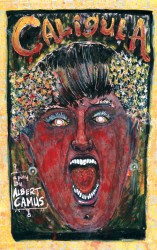Camus does Caligula: Where Philosophy Meets Chaos
If you’ve ever heard of the Roman emperor Caligula, you probably know him as the famous madman who raped his sisters, dissected his mother, and made his horse Consul of Rome. At least, that’s how I knew the figure going in to Arouet’s new production of Caligula by Albert Camus, and I expected to see a theatrical exploration of what happens when you give a madman absolute power (Trump, anyone?). Instead, this dark and verbose play by the famous nihilist philosopher offered up a much more interesting premise: what happens when you give absolute power to a man who understands the concept of absolute freedom? Chaos ensues. This intellectual portrayal of the Roman emperor’s reign of terror takes us inside the twisted logic of a man who is beholden to no rules, whether of religion, law, or custom—a man who simply does exactly what he wants when he wants to.
This theme is excellently brought out in the costume design by Sam Gilworth (and, to some extent, in the set design of Jordan Gerow), which begins exclusively in the grayscale of conventional morality and moves to bright color, sequins, and flamboyant wigs as Caligula introduces more and more chaos into the court of Rome. Eschewing historical recreation for a postmodern mishmash of contemporary clothing with Roman accents (and the occasional nod to Marilyn Monroe), these cell-phone-toting and gun-wielding Romans try to blend ancient history, early twentieth century philosophy, and modern people. While interesting, this conceit occasionally backfires—most notably in a scene where a known conspirator against Caligula forces a pair of musicians to perform at gunpoint so Caligula can dance to their song (why didn’t she just shoot Caligula during his lengthy dance?). In fact, much of the staging, while kinetically spectacular, seems to be governed more by imagery than storytelling, perhaps embodying the theme of chaos but perhaps merely the result of hasty blocking.
The performances run the gamut from comical caricature (the bumbling poets of the poetry competition) to stirring pathos (the complete breakdown in grief of a set of dinner guests forced to laugh at a man’s death), with Danielle Daggerty in the role of Caesonia—Caligula’s tortured lover—as a particular standout. Caligula himself is more interesting intellectually than he is emotionally—Luke Sayler does his best to portray the emperor’s emotional despair, but Camus has given him little to work with and ultimately many of this character’s emotions feel forced. The performances in general suffer from a tendency to play every moment at the highest level; while there are emotionally powerful and striking moments in the play (the murder by inhaler is one of particular note), they don’t pack quite the punch they could have had they been juxtaposed with other scenes that played the stakes lower. As it is, we get a series of loud and urgent moments with no truly quiet and reflective moments to counterbalance them—and to be asked to care intensely about everything ultimately makes nothing particularly stand out and flattens out the play.
All in all, Caligula is a visually striking look into the horrifyingly sensible logic behind apparent madness. If the philosophy of chaos interests you—or you just want to see some highly memorable stage combat—make your way to the Ballard Underground before the show closes.
Caligula by Albert Camus, translated by Christopher Williams. Arouet Productions, Ballard Underground, 2220 NW Market St. Ballard, Seattle, Wa 98107. Thurs, Fri, Sat 7 pm. Ind. nite.PWYC Tues May 17, Sun, May 22 2 pm. thru May 28. Tickets http://caligula.brownpapertickets.com/. Info: http://arouet.us/




















